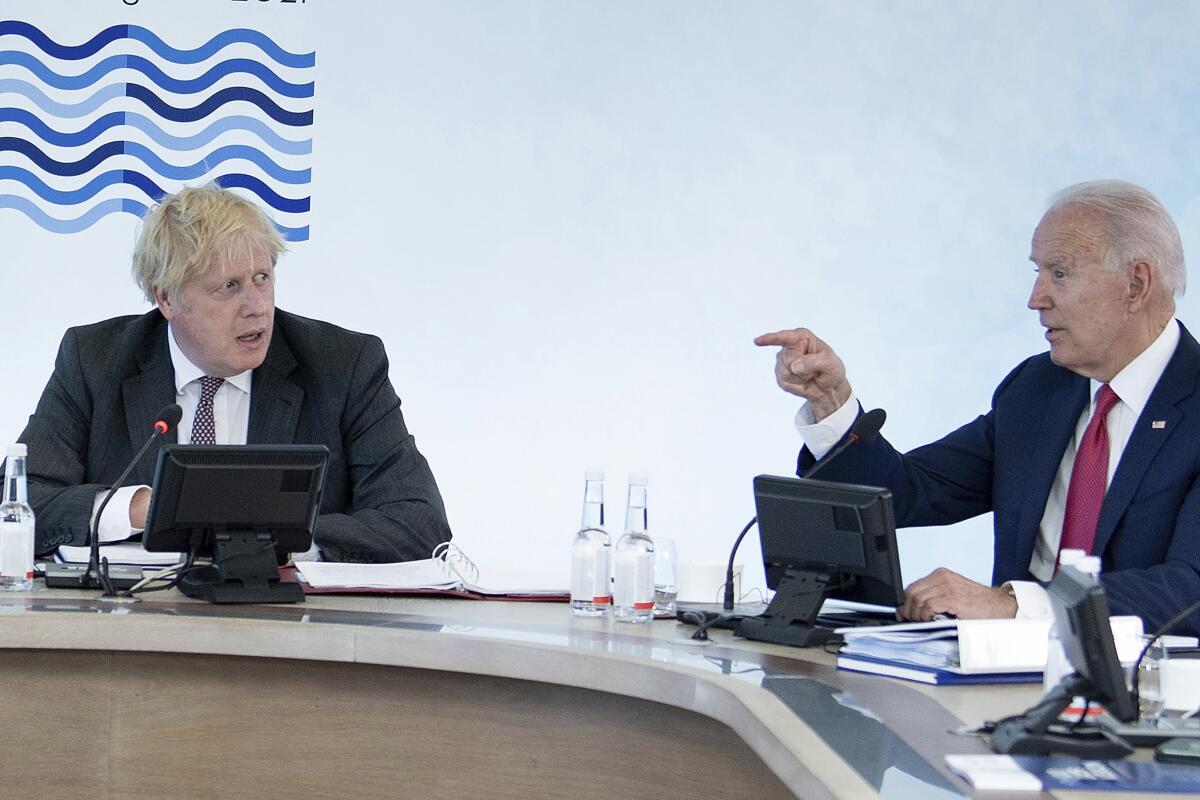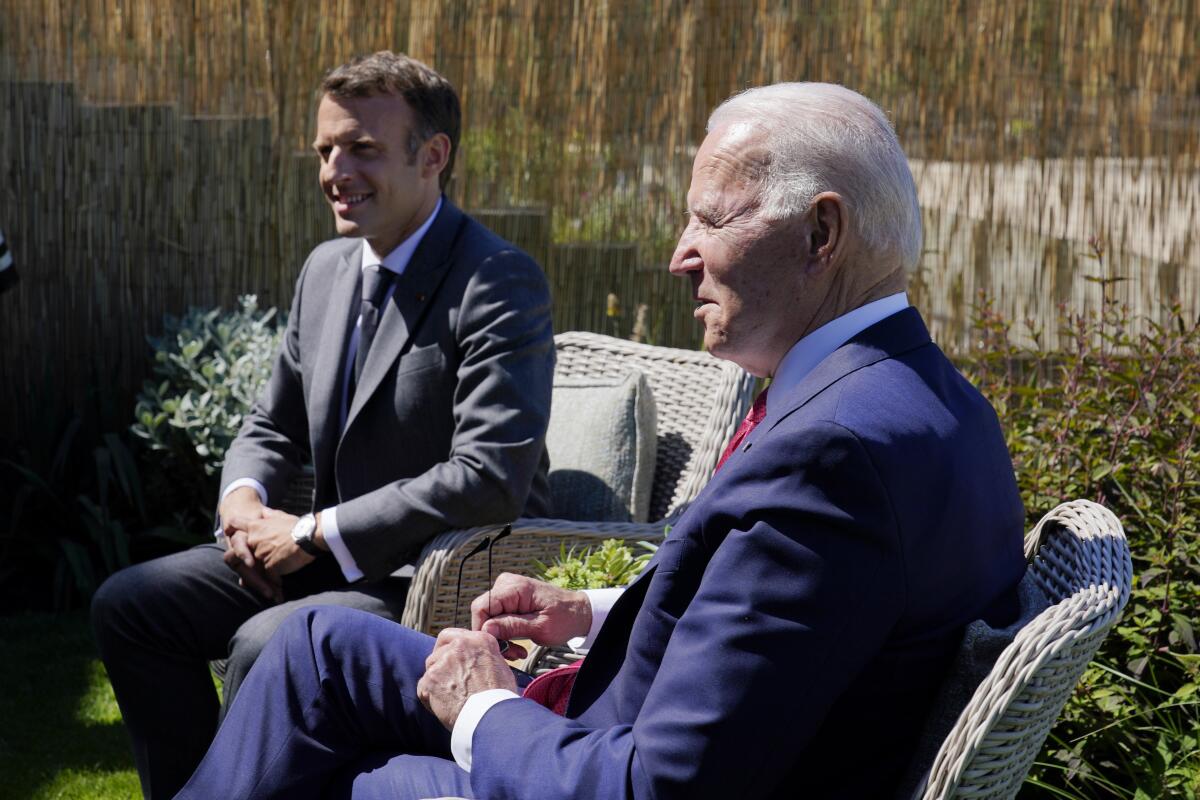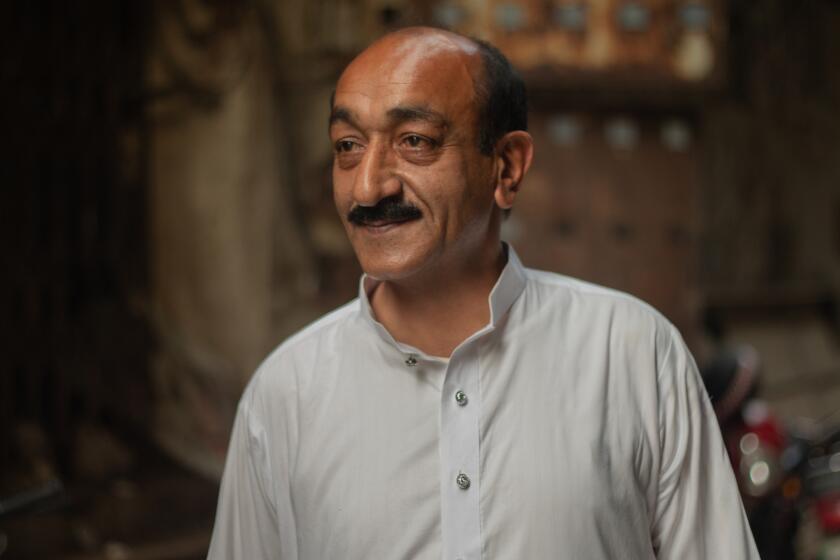Biden presses G-7 allies for bolder front against Chinese influence, forced labor

- Share via
CARBIS BAY, England — President Biden pressed allies in other leading democracies on Saturday to work together to combat China’s growing influence over developing countries.
The centerpiece of the effort is an “infrastructure bank” to offer those nations billions in public and private financing for major projects, offering an alternative to China’s Belt and Road Initiative that has dramatically increased its sway in dozens of smaller countries across the globe.
The move would mark the first major response by the United States and others in the Group of 7 nations — Britain, Canada, France, Germany, Japan and Italy — to the initiative launched by China in 2013.
Unlike the Belt and Road Initiative, which has been criticized for its opaque bidding processes and reliance on low-interest loans that have put borrowing nations at the mercy of Chinese banks and contractors, the U.S.-led initiative would aim to be “values-driven, transparent and sustainable,” said one senior Biden administration official, outlining the plan for reporters on condition of anonymity.
“This is not about making countries choose between us and China,” the official said. “This is about offering an affirmative and positive vision that they would want to choose.”

In addition to requiring that new infrastructure projects be as environmentally sustainable as possible, the venture would also forbid any use of forced labor.
European leaders have been somewhat reluctant to fully align themselves with America’s increasingly confrontational posture toward China. Given their closer economic ties to Beijing, they have been more eager to join forces behind the scenes to work on issues such as intellectual property protections and trade.
While the G-7 allies were eager to join forces on the infrastructure financing venture, some were hesitant about delivering the forceful condemnation of China’s use of forced labor that Biden has lobbied to include in the final summit communique Sunday. The details of that document were still being negotiated Saturday.
“We’re pushing for being specific on areas like Xinjiang, where forced labor is taking place,” the Biden administration official said, referring to the territory in northwest China where tens of thousands of ethnic minority Uyghurs have been forcibly transferred from their homes and assigned to factories across nine provinces to work in a range of supply chains including electronics, textiles and automobiles.
“We think it’s critical to call out the use of forced labor,” the official said, “and to take concrete actions to ensure the global supply chains are free from forced labor.”
During talks Saturday, German and European Commission leaders expressed concern about singling out China on the issue of forced labor, suggesting that the final communique could simply express opposition to the practice more generally.
China’s oppression of Muslims reaches beyond Xinjiang into Pakistan. Why does it stay quiet?
Biden, meeting some of his counterparts for the first time, huddled with several leaders in short sessions, which one aide referred to as “diplomatic speed-dating.” The president held an hourlong meeting with French President Emmanuel Macron on the sidelines of the summit Saturday afternoon.
Macron, who like many of the leaders in the Group of 7 had a contentious relationship with former President Trump, said before the meeting, “It’s great to have a U.S. president who’s part of the club and very willing to cooperate.”
As the two men sat outside in woven chairs at the edge of a broad beach, reporters asked Biden whether he had convinced U.S. allies that America is back. He said, looking at Macron, “Ask him.”
Macron, on the spot, responded: “Definitely.”
Of all the G-7 allies, Macron had been the most outspoken in recent years about wanting to establish more independence from Washington.
Biden also met separately with German Chancellor Angela Merkel and Italian Prime Minister Mario Draghi. They discussed a range of issues, including the future of Afghanistan as the U.S. withdraws its forces there, the White House said. Biden also met quickly with South African President Cyril Ramaphosa, one of four leaders outside the G-7 invited to take part in meetings Saturday.
Biden and British Prime Minister Boris Johnson also met with Australian Prime Minister Scott Morrison, another Saturday invitee.
That discussion, administration officials said, focused on bolstering cooperation between the U.S. and larger Indo-Pacific nations in the region under Biden’s “Quad” initiative — an informal group comprising the U.S., Australia, Japan and India — another effort to counter the economic and military clout of China.
In joining Biden’s infrastructure initiative, the G-7 leaders will be making clear to the world they share his view that this moment could be a global “inflection point” and that it’s imperative for democracies to unite to solve problems and potentially halt the rise of autocracies that have gained power in recent years.
Get our L.A. Times Politics newsletter
The latest news, analysis and insights from our politics team.
You may occasionally receive promotional content from the Los Angeles Times.
After four difficult years of relations with the Trump administration, the allies’ responsiveness to Biden’s agenda also shows a desire for him to succeed. They even called the infrastructure plan “Build Back Better for the World,” adapting the slogan from the president’s domestic agenda.
On Friday, G-7 leaders outlined a new effort to collectively contribute 1 billion doses of COVID-19 vaccine to poorer nations where the pandemic continues to spread. It was another demonstration, they said, of their commitment to come to the aid of other nations without the sort of conditions that are often attached to aid from larger autocracies, namely China and Russia.
More to Read
Get the L.A. Times Politics newsletter
Deeply reported insights into legislation, politics and policy from Sacramento, Washington and beyond. In your inbox twice per week.
You may occasionally receive promotional content from the Los Angeles Times.












